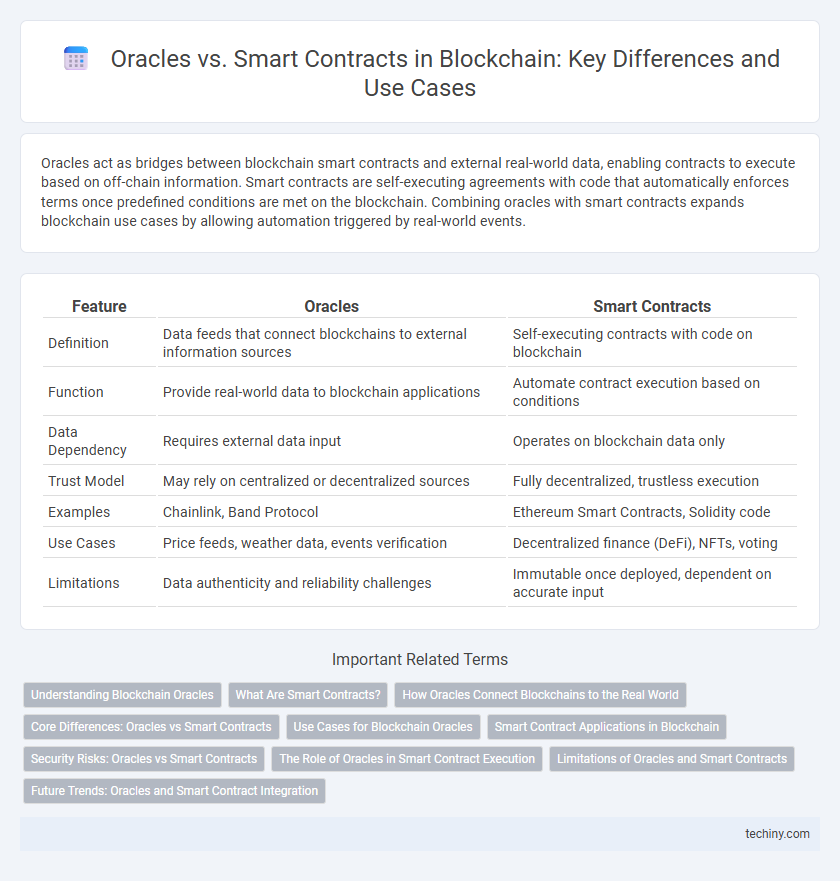Oracles act as bridges between blockchain smart contracts and external real-world data, enabling contracts to execute based on off-chain information. Smart contracts are self-executing agreements with code that automatically enforces terms once predefined conditions are met on the blockchain. Combining oracles with smart contracts expands blockchain use cases by allowing automation triggered by real-world events.
Table of Comparison
| Feature | Oracles | Smart Contracts |
|---|---|---|
| Definition | Data feeds that connect blockchains to external information sources | Self-executing contracts with code on blockchain |
| Function | Provide real-world data to blockchain applications | Automate contract execution based on conditions |
| Data Dependency | Requires external data input | Operates on blockchain data only |
| Trust Model | May rely on centralized or decentralized sources | Fully decentralized, trustless execution |
| Examples | Chainlink, Band Protocol | Ethereum Smart Contracts, Solidity code |
| Use Cases | Price feeds, weather data, events verification | Decentralized finance (DeFi), NFTs, voting |
| Limitations | Data authenticity and reliability challenges | Immutable once deployed, dependent on accurate input |
Understanding Blockchain Oracles
Blockchain oracles serve as critical bridges between on-chain smart contracts and off-chain data sources, enabling contracts to execute based on real-world information such as market prices, weather conditions, or event outcomes. Unlike smart contracts, which operate autonomously within the blockchain environment, oracles fetch, verify, and transmit external data to ensure smart contracts can interact accurately with external events. Understanding the role of decentralized oracles enhances the reliability and security of blockchain ecosystems by preventing single points of failure and data manipulation.
What Are Smart Contracts?
Smart contracts are self-executing agreements coded on a blockchain that automatically enforce and verify the terms of a contract without intermediaries. These contracts utilize predefined rules and conditions to trigger transactions, ensuring transparency, security, and immutability across decentralized networks. By operating on platforms like Ethereum, smart contracts enable trustless and programmable digital agreements essential for decentralized finance (DeFi) and dApps development.
How Oracles Connect Blockchains to the Real World
Oracles serve as critical bridges between blockchains and external data sources, enabling smart contracts to execute based on real-world information such as financial prices, weather conditions, or event outcomes. By providing verified and tamper-proof data inputs, oracles ensure smart contracts interact with off-chain environments securely and reliably. This connectivity expands blockchain applications beyond isolated networks, allowing decentralized systems to react to real-time events and external triggers accurately.
Core Differences: Oracles vs Smart Contracts
Oracles act as external data providers that feed real-world information into blockchain networks, enabling smart contracts to execute based on off-chain data. Smart contracts are self-executing code on the blockchain that automatically enforce agreements once predetermined conditions, often reliant on data from oracles, are met. The core difference lies in oracles serving as bridges between blockchain and external data sources, while smart contracts operate autonomously within the blockchain environment to enforce rules.
Use Cases for Blockchain Oracles
Blockchain oracles enable smart contracts to interact with external data sources, providing real-world information like price feeds, weather conditions, and event outcomes crucial for decentralized finance (DeFi), insurance, and supply chain management applications. Use cases include triggering automatic loan liquidations in DeFi platforms based on real-time asset prices, verifying shipment statuses for transparent supply chain tracking, and validating weather data to automate crop insurance payouts. These oracles bridge the gap between on-chain logic and off-chain data, enhancing the functionality and reliability of smart contracts across various industries.
Smart Contract Applications in Blockchain
Smart contracts enable automated, trustless execution of agreements on blockchain networks, facilitating decentralized finance (DeFi), supply chain management, and digital identity verification. These self-executing contracts reduce intermediaries, enhance transparency, and enforce rules programmed into the blockchain code. Integration with oracles expands smart contract functionality by providing real-world data inputs, but their core applications drive secure and efficient blockchain-based solutions.
Security Risks: Oracles vs Smart Contracts
Oracles in blockchain act as bridges connecting smart contracts with off-chain data, but they introduce security risks due to potential data manipulation or inaccuracies from external sources. Smart contracts are inherently secure through cryptographic methods and blockchain immutability, yet they remain vulnerable if reliant on faulty oracle inputs. Ensuring decentralization and multiple data sources in oracle design mitigates these risks and enhances overall smart contract security.
The Role of Oracles in Smart Contract Execution
Oracles act as critical bridges between blockchain smart contracts and real-world data, enabling automated contract execution based on external events. They provide reliable, tamper-proof data feeds such as market prices, weather conditions, and API outputs, which smart contracts require to trigger actions accurately. By ensuring authentic information input, oracles enhance the trustworthiness and functionality of decentralized applications across finance, insurance, and supply chain systems.
Limitations of Oracles and Smart Contracts
Oracles face limitations including data authenticity issues and potential centralization risks, compromising the reliability of external information fed into blockchain networks. Smart contracts are constrained by their code immutability, making bug fixes and upgrades challenging, and they rely heavily on accurate input from oracles to execute correctly. Both components must address trust and security concerns to ensure fully reliable decentralized applications.
Future Trends: Oracles and Smart Contract Integration
Future trends in blockchain technology emphasize enhanced integration of oracles with smart contracts to enable real-time data access and improve automation capabilities. Advanced oracle networks will provide secure, reliable, and decentralized data feeds, addressing scalability and interoperability challenges faced by current smart contract platforms. This integration will accelerate decentralized finance (DeFi), supply chain transparency, and Internet of Things (IoT) applications by enabling complex conditional logic based on external events.
Oracles vs Smart Contracts Infographic

 techiny.com
techiny.com